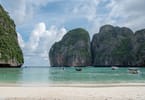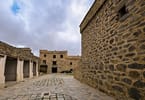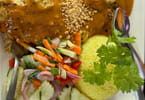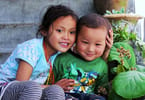The recent volcanic chaos over the skies of Europe was a jolting reminder of our society’s dependence on air travel, accustomed as we are to jet off to far-flung lands. But do we really know about the cultures of the places that we visit? All too often left out of the mix of our busy lives are the very reasons why travel and tourism are so magical.
In my travels, I have named the special moments when we actually communicate and interact with the cultures and peoples that we come across. I am a cultural navigator.
Moments of cultural navigation are the bread and butter of my mission of tourism done a little differently. Cultural communication and knowledge of sometimes-distant lands are the ingredients of this mission with ontheglobe.com that has taken me to almost sixty countries of the globe; from the storied far-flung regions of India to the lush landscapes of Colombia, from the arid canyons of the once sealed-off nation of Kazakhstan to the cultural oasis that is Samoa or the heights of the one-time heart of the Inca empire of Machu Picchu in Peru.
Some tourists miss the local angle
But in too many destinations I have witnessed tourists ferried to hotels and resorts or ports of call where visitors tend to live in a bubble; having little interaction with the local communities that they travel long distances to see.
During a visit to Cuba last year, for instance, I witnessed semi-inebriated guests of all-inclusive resorts who had traveled thousands of miles only experience more drunken encounters with their home-town neighbors than any citizen of their host nation. These people may be missing the wonderfully welcoming attitudes of the good peoples of Cuba from the private accommodations in the eastern village of Baracoa to the western mountains of Pinar del Rio.
And with the arrival of the fresh spring air Europe’s glitterati will soon head toward the sunny island of Hvar in Croatia, few are likely to take an interest in the fact that less than two decades ago the nations hotels were literal refugee hostels for locals fleeing war and conflict. Why not try to understand the real-life stories of the Croatian people who have struggled hard to develop their scenic coastlines into today’s tourism paradise?
My quest for cultural experiences has lead me to dance among Nigerians at the Abuja Carnival during a hypnotic cultural feast of that sub-Saharan country’s many and colorful ethnic groups. I was also among the first tourists of Sub-Saharan nation of Angola, stooding high above the African savannah at the giant rocks of Pungo Andongo in the remote province of Malanje.
Most recently, I trained atop an Asian elephant at the Anantara Golden Triangle Resort in Thailand, becoming acquainted with the lives of the centuries old tradition of the mahouts, a sub-culture of peoples who speak with their own dialect as they live side-by-side their beloved elephants in Thailand. Days ago I returned from the South-Pacific island of Samoa, home to a nation who to this day proudly conserve their chiefly traditions and their three-thousand year old social fabric.
In a fundamental way, empathy in tourism and cultural communication could walk hand-in-hand without taking away from the leisure aspects of travel.
The urgency for cultural and social interaction among global communities came to me almost seven years ago during an interview with South-America’s elder statesman, the former president of Brazil Ferndando Entrique Cardoso for the Budapest-based diplomatic magazine DT-Diplomacy and Trade.
Mr. Cardoso set out the realities of the multilateral world that today is becoming a reality. With the emergence of stronger Asian economies and emerging global markets, groups of medium powers around the world are quickly replacing the shrinking US world dominance with a global web of political alliances.
But this new world order leaves all nations even more interlinked than before. An eventual economic collapse in Greece can reverberate on the European and North American economies, just as disruption to oil production in Nigeria will effect what a Canadian will pay for gas at the pump. The credit-crunch in the US also had a hard-hitting impact on the real-estate boom of the far-off Kazakh capital of Astana.
Our globe has become one big organic family. It’s not a bad idea to know more about lands far and wide, and the people, cultures and histories of those who live there. After all, today they affect our every-day lives.
Tourism can reveal answers
Other cultures solutions might even provide us with some answers to our own challenges. The government-supported longhouses of Malaysian Borneo may provide key solutions to our ailing healthcare or social aid systems, just as the Central American nation of Belize may demonstrate the benefits for all of us in maintaining their rare coral reefs or rainforests. The archeological discoveries about the deforestation inflicted by the ancient Maya in Guatemala at El Mirador may provide keys to how we can avoid the same fate in our treatment of our natural environment.
More culturally astute and aware tourism is likely to achieve partnerships and result in a safer, healthier, and more prosperous future.
Indeed, tourism to less-traveled roads also helps the people on the ground. The United Nations World Tourism Organization, for instance, has long recognized the importance for tourism in the developing and least-developed nations. Here, we’re not only talking about four- and five-star tourism. Much more helpful to local communities are the adventurous backpacker who travels to Angola, Colombia, or Thailand. Those dollars put in the hands of local communities go a long way to helping these countries to build prosperous and entrepreneurial individual futures.
So next time you travel, think of the places that you may not have been. Be a cultural navigator. Engage yourself in a community, because this is the basis of the traditions of human exploration. These are the stories of cultural navigation that we can all write.
Montreal-based journalist and cultural navigator Andrew Princz is the editor of the travel site www.ontheglobe.com. He is involved in country awareness and tourism promotion projects globally. He has traveled to almost sixty countries around the globe seeking to communicate the stories of the diverse peoples and cultures that he comes across, from Nigeria to Ecuador, Kazakhstan to India.






















